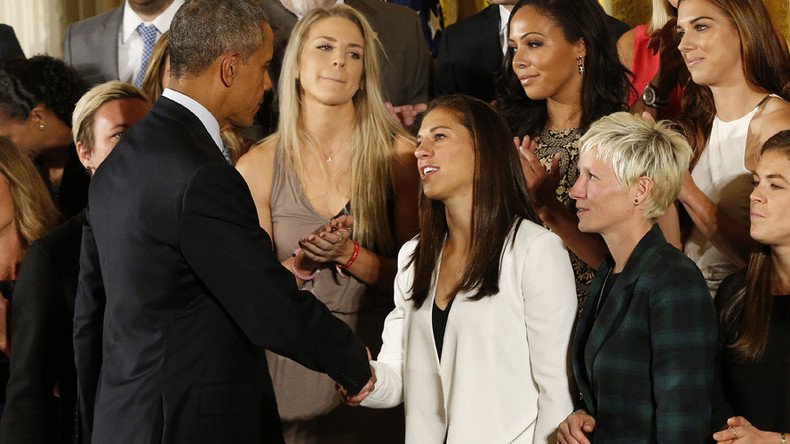Top US female soccer stars file wage discrimination complaint against USSF

Five leading US female soccer stars have filed a federal complaint against US Soccer for wage discrimination. The complaint is the latest flashpoint in a long-running public dispute between the US women's national team (USWNT) and US Soccer.
The five players involved in the complaint are co-captains Carli Lloyd and Becky Sauerbrunn, forward Alex Morgan, midfielder Megan Rapinoe and goalkeeper Hope Solo – five of the biggest names in US women's soccer. Their lawyer, Jeffrey Kessler, has argued that despite similar work requirements and far better performances, the women's team is paid far less than the men's after match bonuses are taken into account.
The USWNT is the reigning World and Olympic champion and is favored to win again in Rio 2016. As such, the players - speaking on behalf of the entire USWNT as per their statement - contend that the women's team is the driving force behind US Soccer's revenues, citing television figures, match attendances and match performances as clear evidence that female soccer players deserve pay equal to that of their male counterparts.
The USWNT players are salaried employees – the top players earn $72,000 a year – but they contend that their bonus structure works against them at the end of the year and puts them at a financial disadvantage, despite outperforming their male counterparts. In comparison, US men's national team (USMNT) players only receive money from US Soccer if they are called to the national team, but their bonus structure is different.
A men’s national team player could receive as much as $17,625 for a win against a top opponent, but would receive $5,000 for a loss in a friendly game. In comparison, a women's team player receives $1,350 for a win against a top opponent, but gets no bonuses for losses or ties.
According to Kessler, both national teams “have identical work requirements. The same number of minimum friendlies, the same requirements about participating and making the World Cup teams — identical work."
“But the women,” he said, “have without dispute vastly outperformed the men not just on the playing field but economically for the USSF [United States Soccer Federation]. The women have generated all the money in comparison with the men.”
The feud between the USWNT players and USSF has been brewing for a few years, but really took off after last year's Women's World Cup. As is customary in other US sports, the players union and the governing sports body signed a Collective Bargaining Agreement (CBA) that outlined player salary and compensation agreements. The previous CBA expired in 2012 and a new one has not been successfully negotiated.
USSF contends that the CBA was extended through a memorandum of understanding (MOU) signed by the two sides in early 2013. The union contends that the MOU was designed to be a stop-gap measure and cannot extend the previous CBA indefinitely.
The players submitted their complaint to the Equal Employment Opportunity Commission (EEOC), a federal agency that enforces civil rights laws against workplace discrimination, requesting an investigation of USSF. The EEOC does not have the jurisdiction to make a decision on the wider CBA dispute between the women's union and USSF, but in couching the issue publicly in terms of equal pay, it also makes the issue more relevant to a wider public discourse in sports and entertainment on the subject.
Although USSF receives a higher budget from FIFA for men's soccer compared to women's soccer, the players have argued that they are directly responsible for the majority of commercial revenue generated each year by USSF, and as such deserve fairer compensation. In the complaint, their lawyer has cited budget figures released by USSF last month – specifically a $20 million increase in revenues in 2015 and a $2.3 million windfall expected in 2016 from the Olympics – as proof USWNT players are short-changed in earnings compared to USMNT players.
“This is the strongest case of discrimination against women athletes in violation of law that I have ever seen,” Kessler said.
While the case could continue until after the Olympics, there is plenty to gain for USWNT players – a successful decision on their behalf could result in players earning millions in back pay.











